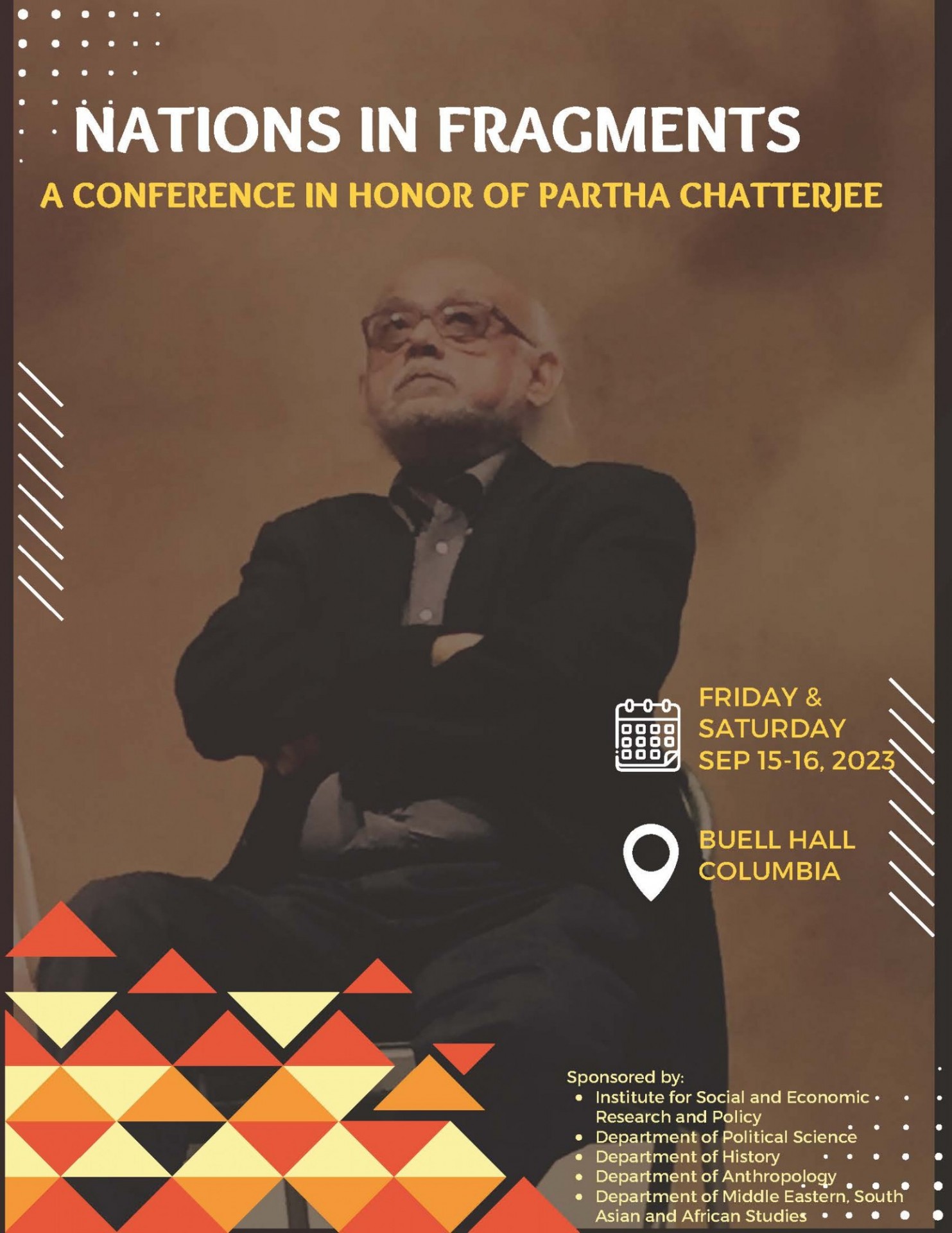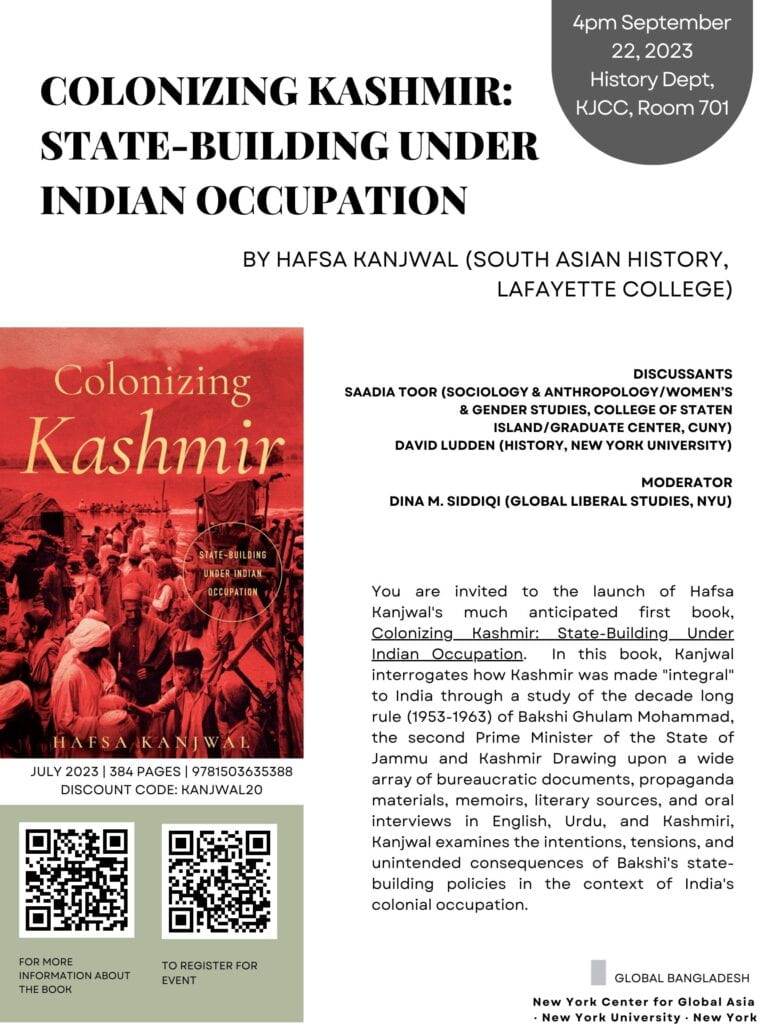Sep 22 4-7pm KJCC 701 (53 Washington Square South)
Book discussion of Hafsa Kanjwal, Colonizing Kashmir: State-building under Indian Occupation, Stanford University Press, 2023. [In-person in King Juan Carlos I of Spain Center (KJCC Room 701, 53 Wash Sq South) auditorium]
with discussants Saadia Toor (CUNY), David Ludden (NYU), and Dina M. Siddiqi
The Indian government, touted as the world’s largest democracy, often repeats that Jammu and Kashmir—its only Muslim-majority state—is “an integral part of India.” The region, which is disputed between India and Pakistan, and is considered the world’s most militarized zone, has been occupied by India for over seventy-five years. In this book, Hafsa Kanjwal interrogates how Kashmir was made “integral” to India through a study of the decade long rule (1953-1963) of Bakshi Ghulam Mohammad, the second Prime Minister of the State of Jammu and Kashmir. Drawing upon a wide array of bureaucratic documents, propaganda materials, memoirs, literary sources, and oral interviews in English, Urdu, and Kashmiri, Kanjwal examines the intentions, tensions, and unintended consequences of Bakshi’s state-building policies in the context of India’s colonial occupation. She reveals how the Kashmir government tailored its policies to integrate Kashmir’s Muslims while also showing how these policies were marked by inter-religious tension, corruption, and political repression.
RSVP HERE to attend in person
Hafsa Kanjwal is an assistant professor of South Asian History in the Department of History at Lafayette College in Easton, Pennsylvania, where she teaches courses on the history of the modern world, South Asian history, and Islam in the Modern World. As a historian of modern Kashmir, she is the author of Colonizing Kashmir: State-building Under Indian Occupation (Stanford University Press, 2023), which examines how the Indian and Kashmir governments utilized state-building to entrench India’s colonial occupation of Kashmir in the aftermath of Partition. Colonizing Kashmir historicizes India’s occupation of Kashmir through processes of emotional integration, development, normalization, and empowerment to highlight the new hierarchies of power and domination that emerged in the aftermath of decolonization. Hafsa has written and spoken on her research for a variety of news outlets including The Washington Post, Al Jazeera English, and the BBC. She received her Ph.D. in History and Women’s Studies from the University of Michigan and a Bachelors in Regional Studies of the Muslim World from the School of Foreign Service at Georgetown University.
Saadia Toor is Associate Professor of Sociology at the College of Staten Island, City University of New York. She has a long history of work within progressive political organizations and groups in Pakistan such as the Women’s Action Forum and the Mazdoor Kissan Party. Dr. Toor’s scholarship revolves around issues of culture, nationalism, gender/sexuality, state formation, and international political economy. A special issue of Women’s Studies Quarterly on the theme of Solidarity co-edited by Dr Toor was published in November 2014. Among her publications are The State of Islam: Culture and Cold War Politics in Pakistan (Pluto Press, 2011), and articles in Interventions: International Journal of Postcolonial Studies, Inter-Asia Cultural Studies, Cultural Dynamics, and Child Labor World Atlas: A Reference Encyclopedia, among other venues.
David Ludden is Professor of Political Economy and Globalization and Chair of the Department of History at New York University. Ludden has directed South Asia programs at Penn, the Social Science Research Council, the Fulbright Senior Scholars program (CIES), the South Asia programs at the Social Science Research Council, and NYU. He has served as President of the Association for Asian Studies and Chair of the NYU Department of History. He has published three monographs on South Asian History and dozens of peer reviewed articles and chapters, and also edited four scholarly volumes and translated a collection of ancient Tamil poems. The breadth of his scholarship includes serious studies of ancient, medieval, and early-modern history, as well as deep research into modern history and contemporary economic and social development.
Dina M. Siddiqi is Clinical Associate Professor in the School of Liberal Studies at New York University. Her research, grounded in the study of Bangladesh, joins development studies, transnational feminist theory, and the anthropology of Islam and human rights. She has published extensively on the global garment industry, non-state gender justice systems, and the cultural politics of Islam and nationalism in Bangladesh. Professor Siddiqi is a member of the New York University Society of Fellows, on the advisory board of Dialectical Anthropology, and on the editorial board of Routledge’s Women in Asia Publication Series. She is on the Executive Committee of the American Institute of Bangladesh Studies (AIBS), and an Advisory Council member of the South Asian feminist network, Sangat. She is currently engaged in a project on economic development, discourses of empowerment and the travels of civilizational feminisms.
RSVP HERE to attend in person




